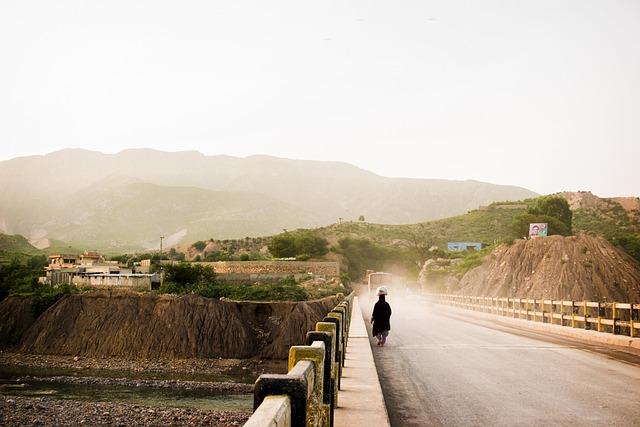In the heart of South Asia, where ancient landscapes meet the complexities of modern geopolitics, Pakistan finds itself at a crossroads—caught in the perpetual ebb and flow of shadows that haunt its national narrative. “Navigating Shadows: Pakistan’s Struggle Against Evolving Terrorism” delves into the multifaceted challenges faced by a nation grappling with the changing face of terrorism. As new ideologies and tactics emerge from the depths of conflict and discord, Pakistan endeavors to adapt its strategies while maintaining its commitment to peace and security. This article takes readers on a journey through the intricate web of historical grievances, socio-political dynamics, and international influences that shape the country’s ongoing battle against extremism. Through careful analysis and compelling narratives, we aim to illuminate the resilience of the Pakistani spirit amidst the darkness, offering a deep understanding of the ongoing struggle and the hope that lies within.
Understanding the Landscape of Modern Terrorism in Pakistan
Pakistan’s experience with terrorism has evolved dramatically over the years, reflecting a complex interplay of domestic and international factors. Various groups, once viewed as ideologically aligned or politically motivated, have splintered into a multitude of factions, each with distinct agendas and operational methods. These factions not only include the remnants of older groups but also new entities that leverage social media and technology to expand their reach and recruit sympathizers. The rise of cyber-terrorism and the use of digital platforms signify a shift in operational tactics, making it increasingly challenging for authorities to predict and counteract threats.
The impact of these developments can be organized into several key themes:
- Radicalization: The process by which individuals, especially youth, are drawn into extremist ideologies.
- Funding Mechanisms: The adaptation of financial support through both traditional and emerging methods, including cryptocurrency.
- International Networks: The collaboration between local and transnational terrorist groups, complicating military and policing efforts.
- Community Resilience: Local efforts to counteract radicalization through education and social programs.
| Challenge | Impact |
|---|---|
| Infiltration of Extremist Ideologies | Destabilizes communities and erodes trust in institutions |
| Smart Technology Usage | Enhances the operational efficiency of terrorist organizations |
| Fragile Economic Conditions | Contributes to higher recruitment rates |
| Weak Counter-Terrorism Policies | Allows groups to flourish and regroup more easily |

Strengthening Governance and Community Resilience
The complex landscape of terrorism in Pakistan calls for an unwavering commitment to enhance governance structures and bolster community resilience. Local authorities play a crucial role in fostering trust within communities, which can lead to improved information sharing and vigilance against extremist activities. Strengthening the fabric of governance involves:
- Enhancing Local Law Enforcement: Providing training and resources to police forces for effective community policing.
- Streamlining Accountability: Implementing transparent systems that ensure government officials are held accountable for their actions.
- Promoting Civic Engagement: Encouraging citizens to actively participate in governance processes fosters a sense of ownership and responsibility.
Moreover, community resilience is a collective effort that transcends individual initiatives. Establishing support networks and local organizations can empower communities to resist radicalization and misinformation. Key strategies include:
- Facilitating Dialogue: Creating platforms for open discussions around social grievances helps dispel myths and prevent the spread of extremist ideologies.
- Investing in Education: Fostering critical thinking and awareness among youth can significantly reduce vulnerability to extremist narratives.
- Strengthening Economic Opportunities: Implementing programs to enhance local employment opportunities disrupts the appeal of extremist groups.

Innovative Strategies for Intelligence and Counter-Terrorism Collaboration
In the complex web of modern terrorism, collaboration stands as a vital pillar for effective intelligence operations. Engaging diverse stakeholders is crucial in developing a unified approach to counter-terrorism. Multi-agency task forces, where intelligence, police, and military units work together, allow for the sharing of fragmented information that might otherwise remain ineffectual. Leveraging technology, such as data analytics and artificial intelligence, can enhance predictive capabilities and expedite response times. By integrating community-led initiatives and training programs for local law enforcement, intelligence agencies can create a more informed public that acts as the first line of defense against radicalization.
Effective collaboration can also be achieved by establishing international partnerships that bridge gaps between nations plagued by similar threats. These partnerships enrich information exchange, foster joint training exercises, and develop shared protocols for crisis response. For example, regular intelligence-sharing forums can facilitate discussions on emerging tactics employed by terrorist groups, while bilateral agreements could streamline extradition processes for suspects. The establishment of a centralized digital platform for data sharing can also help maintain operational continuity across borders. Here’s a simplified comparison of strategies that can be employed:
| Strategy | Benefits | Challenges |
|---|---|---|
| Multi-agency task forces | Enhanced information sharing | Inter-agency rivalry |
| Community-led initiatives | Grassroots engagement | Trust-building required |
| International partnerships | Broader intelligence scope | Diverse legal frameworks |

Promoting Regional Stability and International Partnerships
In the intricate tapestry of South Asia, Pakistan finds itself navigating the multifaceted challenges presented by evolving threats. This necessitates a robust approach to fostering regional stability through strategic alliances and cooperative security frameworks. By engaging with neighboring states and international stakeholders, Pakistan can leverage its position to establish frameworks that not only address its own security concerns but also contribute to the collective resilience of the region. Cooperation on intelligence sharing, counter-terrorism operations, and collaborative military exercises stands at the forefront of these initiatives, ultimately aimed at creating a united front against radical elements.
Moreover, deepening international partnerships can amplify Pakistan’s efforts to combat terrorism while simultaneously enhancing economic stability. Engaging with global entities offers access to vital resources and expertise, especially in areas such as technology, training, and development. Through diplomatic channels, Pakistan can advocate for inclusive strategies that encompass economic cooperation and social development. The focus should be on building sustainable partnerships that prioritize not only security but also the socio-economic upliftment of communities, ultimately reducing the appeal of extremist ideologies. Key areas to target include:
- Joint Counter-Terrorism Initiatives
- Economic Development Programs
- Intelligence Sharing Mechanisms
- Cultural Exchange and Awareness Programs
Future Outlook
As we draw the curtains on this exploration of Pakistan’s ongoing battle against the shadows of evolving terrorism, it becomes evident that the road ahead is fraught with challenges yet glimmering with potential. The intricate interplay of historical grievances, socio-political dynamics, and the resilience of a nation striving for peace presents a complex tapestry that must be navigated with diligence and foresight.
In a world where the nature of threats continues to shift, Pakistan’s journey reflects a larger narrative of vigilance and adaptation. As the country seeks to redefine its security landscape, the importance of community engagement, international cooperation, and strategic foresight cannot be overstated. The fight against terrorism is not just a struggle against an abstract force; it is a plea for the safety, stability, and dignity of every citizen.
While the shadows may loom large, they are not insurmountable. With each step taken towards understanding and addressing the root causes of extremism, Pakistan illuminates a path that could inspire other nations facing similar trials. In this ongoing saga, the story is not just one of conflict, but also of hope—hope for a future where shadows are dispelled by the light of peace, unity, and resilience. As we leave this critical discourse, let us carry forward the lesson that in the face of adversity, the strength of a nation lies in its unwavering commitment to a brighter tomorrow.



